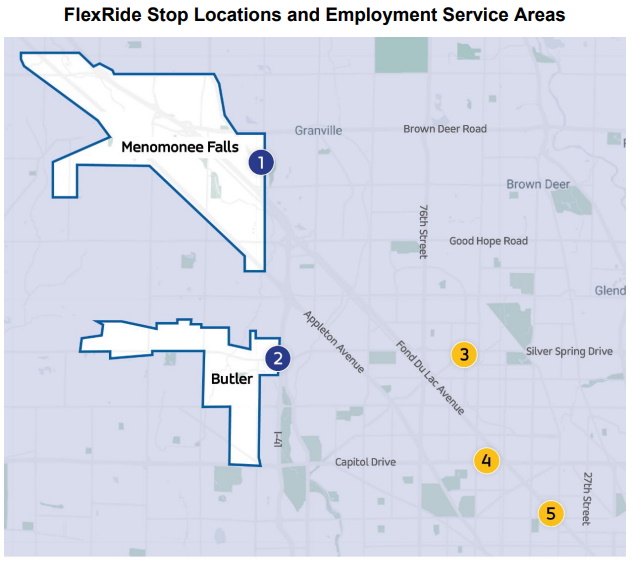New ‘Last Mile’ Solution Will Connect Suburban Employers, City Residents
New service launches in February with $1.50 rides.
A new transportation service will attempt to provide a low-cost, on-demand connection between central city Milwaukee residents and Waukesha County employers.
Dubbed FlexRide Milwaukee, the service is designed to fill a gap in the Milwaukee and Waukesha bus systems. The pilot effort, which will last at least through fall 2022, is being funded by a $1 million grant from the National Science Foundation.
Led by UW-Milwaukee and the Southeastern Wisconsin Regional Planning Commission (SEWRPC), the pilot study is being billed as a micro-transit effort that will attempt to bridge the spatial mismatch between residents on the north side of Milwaukee and suburban employers. Transportation services that attempt to fill a gap between a transit network and a final destination are often referred to as “last mile” solutions.
The new service will have smaller vehicles than traditional 40-foot buses and will replace the short-lived JobLines bus routes. The Milwaukee County Transit System instituted the service in 2015 using proceeds from the $13.5 million Zoo Interchange settlement. But the service was canceled in 2019 as a result of low ridership and a funding shortage. The last “JobLine” operated as an extension of an existing bus route and ran on a schedule.
The new service, operated by Via, will run on-demand and go point-to-point instead of on a fixed route.
“We are excited to be collaborating with our partners on a technology-driven solution to a longstanding problem for our region – access to jobs,” said SEWRPC Executive Director Kevin Muhs in a statement. “Lack of transportation is too often a barrier for workers wanting to get to jobs and employers wanting to attract new employees, made worse during the pandemic. This is one step toward closing that gap and making us stronger as a region.”
Fares from the Silver Spring Neighborhood Center, Midtown Center and Sherman Phoenix to anywhere in the employment zones will start at $1.50 each way and grow to $3. But rides are free if they originate from or end at the remaining two pickup points, which are the intersections of N. 124th St. and W. Bradley Rd., and N. Lovers Lane Rd. and W. Silver Spring Dr.
Each of the pickup points is served by multiple MCTS routes. FlexRide, which will operate from 5 a.m. to 9 p.m., is intended to provide flexible rides from the designated pickup points to a broad array of employers and then provide door-to-pickup-point reverse trips.
Unlike traditional bus service, riders must register in advance to use the service and be 18 or older.
“We encourage anyone who currently works in one of the service areas – or is hoping to – to consider signing up for FlexRide,” said Chytania Brown, president and CEO of Employ Milwaukee. “As Milwaukee County’s workforce development board, we work every day to develop workforce solutions that promote regional economic growth and employment
opportunity for all job seekers. FlexRide Milwaukee does just that.”
The service is scheduled to launch in early February. Riders can use a smartphone application to request a ride or call 414-667-7433. More information is available at FlexRideMKE.com.
The UWM research team is led by School of Architecture and Urban Planning faculty members Lingqian Hu and Robert Schneider and Center for Economic Development Associate Scientist Yaidi Cancel Martinez.
“We want to thank all partners on this project, who have been doing solid foundational work in our region for years,” Hu said. “The NSF award recognizes the potential impact that our teamwork can have in connecting research with real-world solutions. Successful implementation of the pilot will address transit and other obstacles that deter marginalized population groups from accessing jobs in the Milwaukee region.”
The operational grant builds on an earlier $50,000 grant to design the project.
MobiliSE is working with other partners on a similar effort for other Waukesha County communities. A 2017 Wisconsin Policy Forum report explores the challenges and opportunities of last-mile transit to suburban job centers.
Jeramey Jannene serves on the board of MobiliSE, but did not have any direct involvement in the project’s development.
If you think stories like this are important, become a member of Urban Milwaukee and help support real, independent journalism. Plus you get some cool added benefits.
Transportation
-
Congestion Pricing Cuts Air Pollution in New York City
 Dec 14th, 2025 by Jeff Wood
Dec 14th, 2025 by Jeff Wood
-
FTA Tells Milwaukee to Crack Down on Fare Evasion — Even Where Fares Don’t Exist
 Dec 12th, 2025 by Graham Kilmer
Dec 12th, 2025 by Graham Kilmer
-
Will GOGO’s Bus Service Ever Get Going?
 Dec 9th, 2025 by Jeramey Jannene
Dec 9th, 2025 by Jeramey Jannene























If business owners built near established public transportation routes and population centers., the need for services such as these would not be needed. Too often businesses put up buildings in the far suburbs and then complain that they can’t find workers. There are numerous sites in Milwaukee County that could be used for development. The old Oster headquarters in Glendale near I-43 and a bus line has been almost totally vacant for several decades.